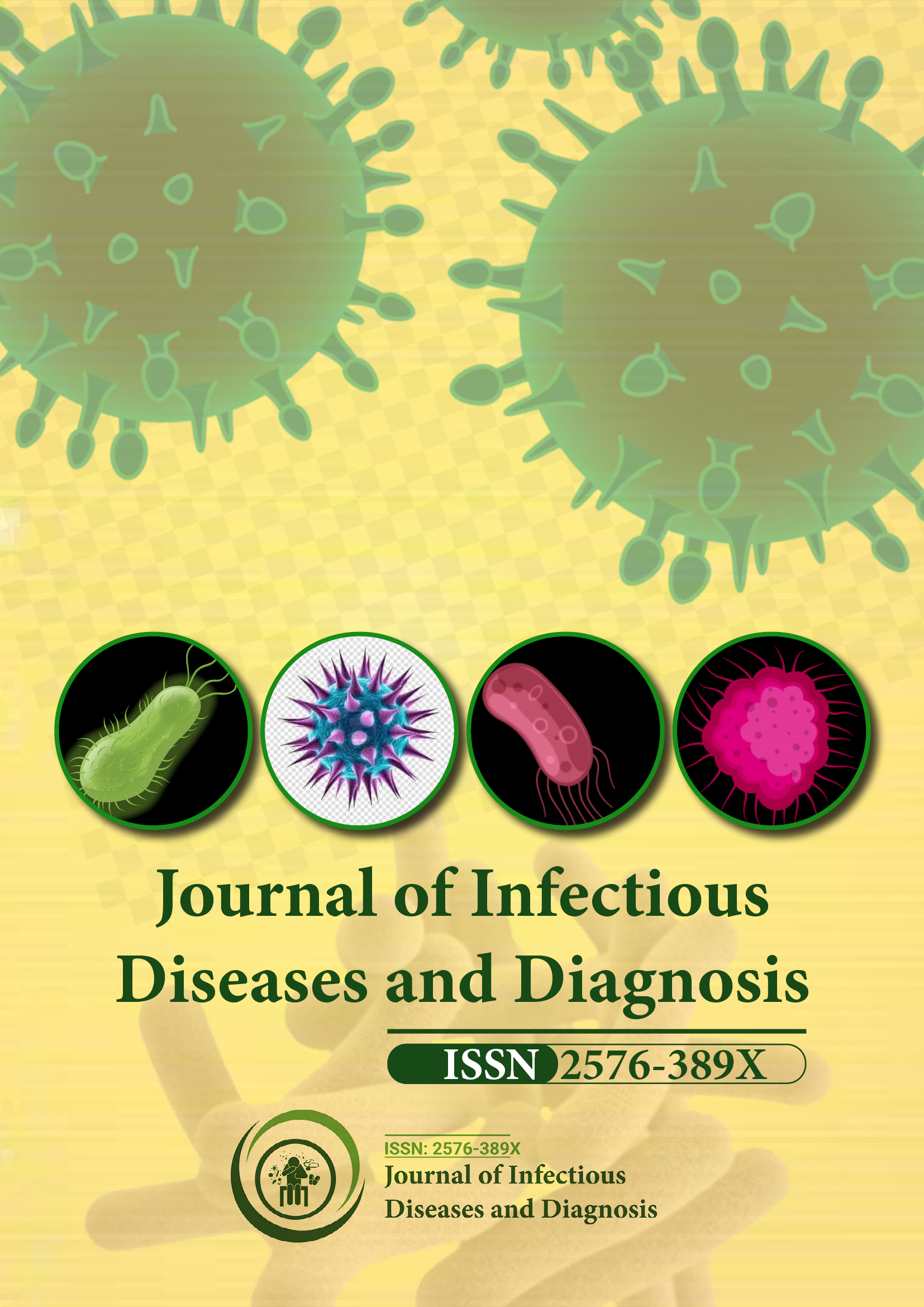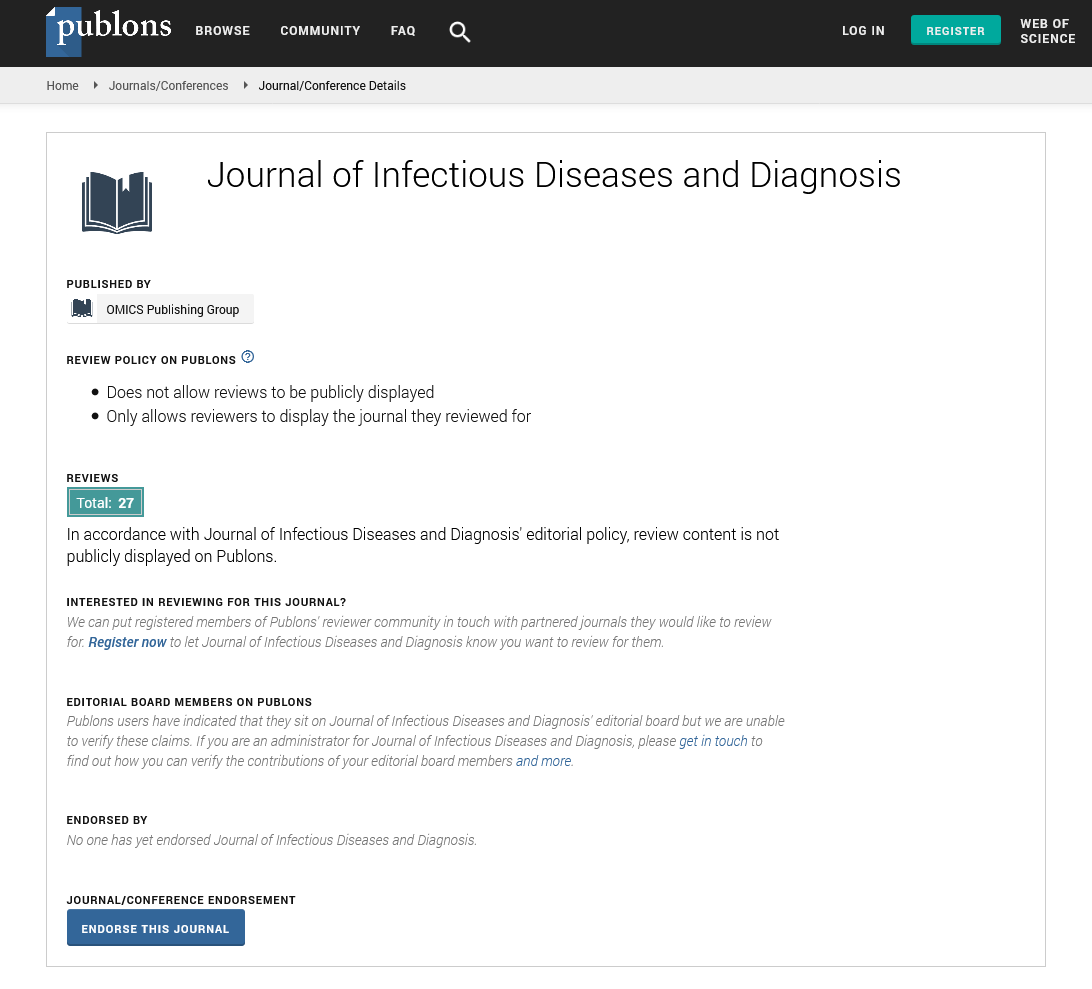Indexed In
- RefSeek
- Hamdard University
- EBSCO A-Z
- Publons
- Euro Pub
- Google Scholar
Useful Links
Share This Page
Journal Flyer

Open Access Journals
- Agri and Aquaculture
- Biochemistry
- Bioinformatics & Systems Biology
- Business & Management
- Chemistry
- Clinical Sciences
- Engineering
- Food & Nutrition
- General Science
- Genetics & Molecular Biology
- Immunology & Microbiology
- Medical Sciences
- Neuroscience & Psychology
- Nursing & Health Care
- Pharmaceutical Sciences
Perspective - (2023) Volume 8, Issue 5
Chronic Inflammation and Immune Dysfunction in HIV-Related Aging
Maria Rosa*Received: 04-Sep-2023, Manuscript No. JIDD-23-23538; Editor assigned: 06-Sep-2023, Pre QC No. JIDD-23-23538 (PQ); Reviewed: 20-Sep-2023, QC No. JIDD-23-23538; Revised: 27-Sep-2023, Manuscript No. JIDD-23-23538 (R); Published: 04-Oct-2023, DOI: 10.35248/2576-389X.23.08.235
About the Study
The HIV/AIDS pandemic has posed one of the most significant global health challenges of our time. Since its discovery in the early 1980s, extensive research has elucidated on various aspects of the virus, from its transmission and pathogenesis to treatment and prevention. One of the more recent and intriguing areas of investigation is the potential link between HIV infection and accelerated aging. While aging is a natural biological process, there is increasing evidence to suggest that individuals infected with HIV may experience premature aging, not just in terms of chronological age but also in the way their bodies and minds function. In this study, we will explore the hypothesis that accelerated aging with HIV begins at the time of initial infection, drawing from existing research and examining its implications for clinical management and patient care.
Accelerated aging in the context of HIV refers to the idea that individuals living with the virus experience age-related health problems and conditions earlier than their uninfected counterparts. This phenomenon manifests in a variety of ways, including a higher incidence of conditions typically associated with older age, such as cardiovascular disease, cognitive decline, osteoporosis, and frailty. However, it is essential to note that this concept does not imply that individuals with HIV are destined to suffer from aging-related health problems but rather that the presence of the virus may predispose them to such conditions at an earlier age.
The concept of accelerated aging in HIV has prompted researchers to investigate the potential mechanisms underlying this phenomenon. There are several theories, including chronic inflammation, immune dysfunction, and antiretroviral therapy side effects. These factors may interact with one another, compounding the impact of HIV infection on the aging process.
Chronic inflammation has emerged as a key factor in the acceleration of aging in HIV. HIV infection triggers a persistent state of immune activation and inflammation, even when the virus is well-controlled with Antiretroviral Therapy (ART). This chronic inflammation can have a detrimental effect on various organ systems, including the cardiovascular system, nervous system, and musculoskeletal system.
For instance, individuals with HIV are at an increased risk of developing atherosclerosis and related cardiovascular diseases. Chronic inflammation can lead to endothelial dysfunction, plaque buildup in arteries, and ultimately, cardiovascular events such as heart attacks and strokes. Such conditions are typically associated with older age but have been observed in individuals with HIV at younger ages.
Additionally, chronic inflammation may contribute to neurocognitive disorders commonly referred to as HIVAssociated Neurocognitive Disorders (HAND). These disorders manifest as cognitive impairment, affecting memory, attention, and executive functions. The inflammation and immune activation triggered by HIV are believed to play a major role in the development of HAND, further suggesting a connection between HIV infection and premature aging of the central nervous system.
Another aspect of accelerated aging with HIV is the dysfunction of the immune system itself. The immune system undergoes changes with age, and in individuals with HIV, these changes seem to occur more rapidly and at an earlier stage of life. HIV leads to a depletion of CD4+ T-cells, weakening the immune system's ability to fight off infections. Over time, this can lead to a condition known as immunosenescence, where the immune system resembles that of an older individual.
Immunosenescence may result in diminished immune responses to new infections and decreased effectiveness of vaccinations. Additionally, individuals with HIV are at an increased risk of developing non-AIDS-related conditions, such as certain cancers and neurodegenerative diseases, which may be linked to immune dysfunction. Thus, the aging of the immune system in people living with HIV may contribute to the onset of age-related conditions earlier than expected.
Antiretroviral therapy and aging
While Antiretroviral Therapy (ART) has transformed the treatment of HIV, it is not without its own potential contributions to accelerated aging. Some ART medications have been associated with metabolic changes, such as increased fat accumulation in specific areas of the body and elevated cholesterol levels. These changes can lead to metabolic syndrome and insulin resistance, both of which are risk factors for cardiovascular disease and diabetes.
Furthermore, the long-term use of ART raises questions about the potential impact on mitochondrial function. Mitochondria are essential cellular organelles responsible for energy production, and any dysfunction in these structures can accelerate the aging process. Some studies have suggested that certain ART drugs may have adverse effects on mitochondrial function, but further research is needed to fully understand the implications.
Conclusion
The hypothesis that accelerated aging with HIV begins at the time of initial infection represents a multifaceted challenge with far-reaching implications for individuals living with the virus and the healthcare providers who support them. Chronic inflammation, immune dysfunction, and the potential effects of antiretroviral therapy are interconnected factors that contribute to this phenomenon.
Recognizing the early onset of aging-related health problems in individuals with HIV is essential for designing effective clinical management strategies and providing comprehensive patient care. By focusing on early diagnosis, tailored healthcare, lifestyle interventions, and continued research, we can work to improve the quality of life and longevity of those affected by HIV. The intersection of HIV and aging is a complex issue that demands further exploration, as it holds the potential to redefine our approach to the long-term care of individuals with HIV.
Citation: Rosa M (2023) Chronic Inflammation and Immune Dysfunction in HIV-Related Aging. J Infect Dis Diagn. 8:235.
Copyright: © 2023 Rosa M. This is an open-access article distributed under the terms of the Creative Commons Attribution License, which permits unrestricted use, distribution, and reproduction in any medium, provided the original author and source are credited.

